#natuzza evolo
Text
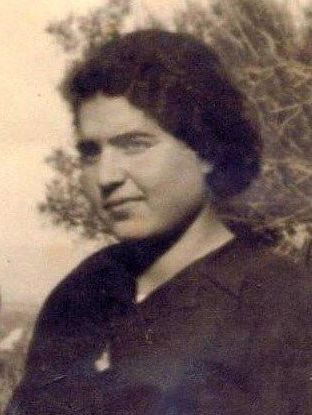
The Story Of Natuzza Evolo: Calabrian Mystic
Natuzza was a Calabrian mystic who acted as a medium and healer, showed evidence of stigmata, and could “bi-locate” — be in two different places at once. She is also connected with “hemography,” which is when blood stains miraculously transform into symbols, shapes, and even words, particularly Christian ones like crosses.
Natuzza was born in 1924 in Paravati, a tiny hamlet near Mileto in Calabria. Her given name is Fortunata, from which the diminutive “Natuzza” comes. Natuzza’s father had left for Argentina a few months before she was born, and he never returned, leaving Natuzza’s mother alone to care for her newborn as well as her other children.

Natuzza never learned to read or write and helped support her mother and siblings by working for local families. She allegedly began having her first visions as a small child — Jesus, it is said, appeared to her as a boy who played with her and one of her brothers — but her brushes with the dead didn’t become popular knowledge around town until she began experiencing them as a young teen at work.
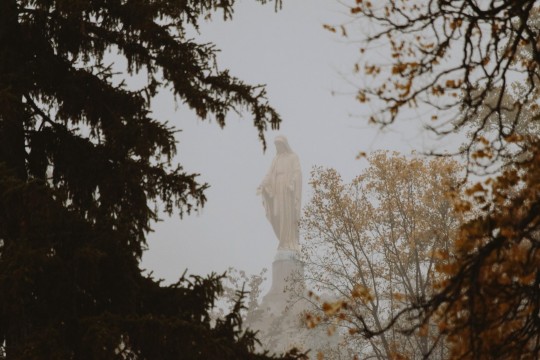
And it wasn’t just apparitions with Natuzza, even as a child. At her First Holy Communion, her mouth reportedly filled with blood when the wafer symbolizing the body of Christ was placed inside. At her Confirmation, a large stain of blood in the form of a cross formed on the back of her shirt.
Because of Natuzza’s experiences with the paranormal, as a young woman she was closed in an asylum with a diagnosis of "hysterical syndrome" for a few months by the local priest and was not permitted to enter a convent to become a nun.

Natuzza became known for the appearance on her body of blood-coloured images and words around the time of Easter and these caused her great psychological and physical pain. Some of the words were found to be Hebrew and Aramaic which was strange because she could not read or write, even in her native Italian. For decades devout Catholics from Calabria, then the rest of Italy and other parts of the world, began coming to her to ask for advice and prayers and to ask her for information about the souls of their relatives.
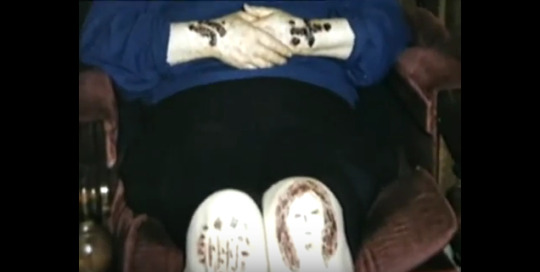
In addition to seeing Jesus, Natuzza also claimed to have also seen and communicated with the Virgin Mary, angels, and the dead, particularly souls in purgatory, throughout her life.
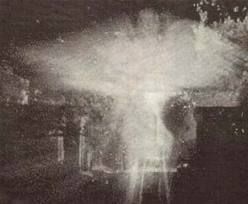
Natuzza was also considered a healer, credited with being able to look at a person and tell them what was ailing them, physically — using formal, medical terminology — as well as suggest treatments. She could also see the future and sometimes spoke in languages she didn’t know (remember, again, she was illiterate). In fact, some of her blood stains even transformed into phrases in foreign languages.
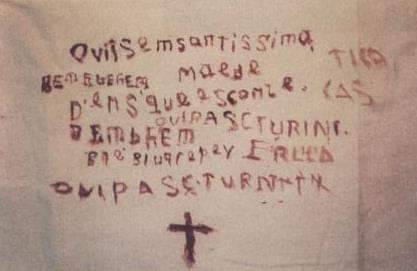
However, Natuzza never accepted money for what she did or was accused of participating in anything fraudulent based on her abilities, which, in the eyes and hearts of many, lend credence to her and her followers’ claims.
"It's a question of removing the suggestive religious context from the event. It doesn't allow rational reading since it cloaks it in mythology and unprovable hypotheses," says the Italian Committee for the Checking of Pseudoscientific Claims, or CICAP.
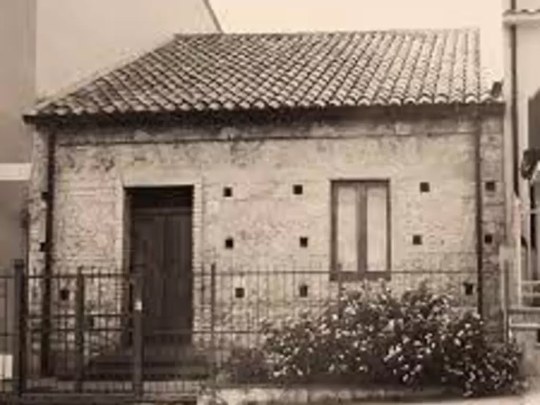
The group believes the so-called stigmata cases are really examples of Gardner-Diamond syndrome, "a skin condition that, although rare, is well documented in medical literature." The syndrome gives rise to a series of periodic, painful and bleeding bruises of unclear origin, combined with psychiatric disorders such as self-harm.
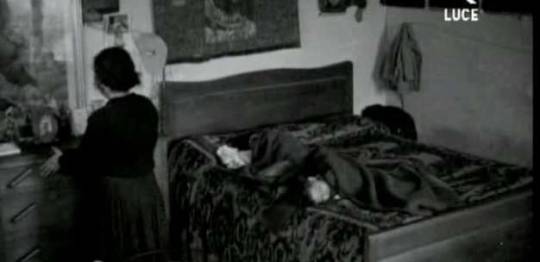
Although she’s relatively unknown internationally, Italians have been fascinated by Natuzza for generations as she has been a popular subject of books and various Italian television programs.
After Natuzza passed away on All Saints’ Day in 2009, about 30,000 people traveled from all over Italy and beyond for her funeral in rural Calabria. One-hundred priests and six Italian bishops were also in attendance.
Follow us on Instagram, @calabria_mediterranea
#natuzza#natuzza evolo#mystery#calabria#italy#italia#south italy#southern italy#mileto#paravati#stigmata#apparition#blood#paranormal#visions#bilocation#catholic#catholicism#religion#marian apparitions#virgin mary#holy mary#jesus christ#jesus#pseudoscience#christianity#christianism#italian#roman catholic#roman catholic church
13 notes
·
View notes
Text
NATUZZA EVOLO, THE WOMAN THAT OPENED MY MIND AND HEART
The man I met in Rome, in the Church of Saint Paul Outside the Walls, who gave me a list of forty-two books, among other things, told me about two mystical figures: one was Padre Pio of Pietrelcina, who had already died, and another Natuzza Evolo, who was still alive.
I trusted that man because the books he had recommended me to read were highly educational. I thought that if he told me about…

View On WordPress
0 notes
Text
sono in diretta tra poco

🎙️ Sono in Diretta su Radio Cantù Brianza FM 89.6 alle ore 19:30 (17:30 UTC) 🕖
🌌 Per iniziare la settimana con la carica giusta, anche questo lunedì 22 luglio (penultima puntata della stagione 2024), Star Trek ritorna su Radio Cantù Brianza, sempre in diretta dal mio studio casalingo di Broni (Oltrepò Pavese) 🏠
📡. Ecco le coordinate astrali per salire a bordo dell’astronave Enterprise, se vi fa piacere! 🚀
📻 Sintonizzatevi sugli 89.6 FM, visitate il sito di Radio Cantù FM 89.6 o scaricate l’app gratuita della radio per ascoltarmi ovunque voi siate 🌍📻.
Disponibile anche su Alexa e Google 🗣️🔊. E sulla maggior parte di aggregatori di streaming
🆕Novità: diretta congiunta su mixcloud (nickname thebynight) e Twitch (nickname andybynight71)
Entra a far parte della mia crew, in diretta o tramite WhatsApp e Telegram al numero 3774563033 (Studio Oltrepò), e partecipa attivamente alla trasmissione 📞💬.
Durante la serata, parlerò di Greenpeace, Natuzza Evolo, e di cinema italiano e tanto altro ancora. Non mancate!!
🎭🎬.
🎵📰📻🎉🔮🎥🇮🇹🌃🌐
#music#news#radio#intrattenimento#misteri#cinemaItaliano#buonaserata#Greenpeace#NatuzzaEvolo#latuacittàaportatadiradio#onair#radiocantù#radioitaliane
0 notes
Video
youtube
Natuzza Evolo: ho visto il paradiso, ecco cosa accade 40 giorni dopo la ...
0 notes
Text
Il docufilm su Natuzza presentato a Roma
Storie ed emozioni hanno accompagnato nei giorni scorsi tanti calabresi e no che hanno assistito alla prima del docufilm “Il rifugio delle anime” la storia di Natuzza Evolo a cura del giornalista Pino Nano e Maurizio Pizzuto con la regia di Simone Rubin. il docufilm e’ stato girato dalla Studio Colosseo di Roma e andrà’ in onda il prossimo primo dicembre alle 23:00 su Rai 3. Per l’occasione,…

View On WordPress
0 notes
Text
Question
Dear Father Angelo,
First of all, thanks for your precious Service.
My doubt has to do with the role of human suffering.
I read the witnesses of some mystical Christians, recognized as such by the Church, about the souls of Purgatory.
Purgatory is described by Natuzza Evolo, for instance, as a dimension of huge pain where the departed must stop for specific periods of time before they can access Heaven, in order to atone for the non-mortal sins that were committed in life.
I understood (correct me if I am wrong) that the duration of this stay and the intensity of the sufferings can be mitigated for these souls by God only if the living on earth pray for them and offer holy services for their souls or devote their own earthly sufferings to them.
What I struggle to understand is the meaning of the “necessity” of pain as sine-qua-non to see the Father.
So is the real “lucky one” only the one suffering?
Consequently are physicians, healthcare and social workers that try to reduce people’s pain actually distancing their patients from the real Joy?
Instead, are those causing suffering to their brothers, are they, in spite of themselves, from the victims’ perspective, the real “good” ones who should even be thanked for this?
What degree of penance awaits one who leads a long healthy peaceful life committing non-mortal sins?
Through which mechanism are the earthly pleasures, mediated by our miserable and overly limited physiological senses, paid for with detachment from the Supreme Pleasure (the vision of the Celestial Father) whereas the earthly sufferings are rewarded with increased proximity to the Light?
For the sake of argument, if tomorrow morning scientists claimed to have found the panacea, the cure-all, what should the suffering christian do? Should he refuse it?
If one day somebody finds a drug, herb or a cerebral microchip that is able to make everybody “happy” (from the point of view of the senses, mood and “flesh”) for all their life, and without the side effects of today’s known substances, will this represent a spiritual threat for men?
Yet, miracles of physical recovery do exist.
As you can see, Father Angelo, I am rather confused.
Thanks again.
Mario
The Priest’s answer
Dear Mario,
1. The vision you are describing is more Buddhist rather than Christian. According to the Buddhists, and other believers also, our current life is a life of purification, where you reincarnate several times to be perfectly purified and enter the so-called Nirvana.
Instead, the Christian life is a life where you can grow more and more in the love of God, in the communion of life with Him and your brothers.
2. Of course, there is also suffering in life.
But this is precious only in as much as it helps you grow in love.
The Christian life is not a life of suffering nor is it mainly a life of purification, although this is essential for our love to become more and more pure and holy.
3. It is clear that if you consider only Purgatory, I can agree with you that the meaning of that state of life is the purification of our love, our charity.
However, just as it is not right to look only at prisons, and to conclude that the meaning of life is atonement, so it is not right to look only at Purgatory, when understanding the sense of human life, and even more so of Christian life.
Especially since some people do not even pass through Purgatory to go to Heaven.
4. You also write: “I understood (correct me if I am wrong) that the duration of this stay and the intensity of the sufferings can be mitigated for these souls by God only if the living on earth pray for them and offer holy services for their souls or devote their own earthly sufferings to them”.
Since you say “correct me if I am wrong”, I will gladly correct you.
The sufferings of Purgatory are not mitigated by God, instead it is the very soul that purifies itself by embracing the charity that it receives from those still living. It’s being gradually peeled off
to purity.
5. Moreover, the living can help souls in Purgatory only by means of the charity that includes prayers, the offering of their own works, their acts of love for God and for neighbours, the celebration of the holy service…
This charity also embraces afflictions, sufferings, if they are lived in conjunction with Christ’s atoning sufferings.
But if the sufferings are not lived in union with Christ and therefore as an act of love, they are useless.
6. You also add: “Through which mechanism are the earthly pleasures, mediated by our miserable and overly limited physiological senses, paid for with detachment from the Supreme Pleasure (the vision of the Celestial Father) whereas the earthly sufferings are rewarded with increased proximity to the Light?”.
What you affirm, although with a question mark, is totally wrong.
Why do you have to pay for earthly pleasures?
Didn’t God, our Creator, want pleasure as a state of satisfaction of our necessities?
Why should the celebration of a victory, a degree, the passing of an exam or the recovery from an illness be evil?
Why should the consumption of three meals a day be an evil you should pay for?
As you can see, it is not compliant with the Gospel, what you erroneously consider to be evangelical.
7. A whole different story, instead, are the disordered pleasures. These, yes, are evil and require medicine and a corrective action.
8. If one day all sufferings are cancelled, we could just rejoice.
However, this would not solve the root problem of human life, which is given to us to get ready for Heaven through a deeper and deeper communion of love with God and our neighbour.
In the hope of having taken away some confusion, I will offer you my prayer (which is not a source of suffering but joy) and I bless you.
Father Angelo
24th July 2020 | A priest answers – Moral Theology- Essential Morality
Translated by Irene Visciano
0 notes
Text
IL DEMONIO NON PUÒ FARE NULLA CONTRO LE ANIME ELETTE E CHE SERVONO DIO .QUESTO ACCRESCE LA SUA RABBIA VERSO DI ESSE E LE INFASTIDISCE IN QUALSIASI MODO,ANCHE NEI MODI PIÙ BRUTI , FACENDOGLI DEL MALE FISICO(PADRE PIO E NATUZZA EVOLO PER FARE DUE ESEMPI VENIVANO MALMENATI SPESSO DA SATANA) PERCHÉ NON SOPPORTA LE PERSONE CHE GLI STRAPPANO LE ANIME DALLE MANI.BISOGNA PREGARE MOLTO(SPECIALMENTE LA CORONCINA DEL SANTO ROSARIO) PER SALVARE LA NOSTRA ANIMA E QUELLA DEI NOSTRI CARI.IL MALIGNO È SEMPRE IN AGGUATO ,LE ANIME CHE SA SONO GIÀ SUE NON LE INFASTIDISCE OVVIAMENTE .MA LUCIFERO HA SEMPRE PERSO E SEMPRE PERDERÀ CONTRO DIO !!!. SIA LODATO GESÙ CRISTO 🔥🔥🔥♥️♥️♥️🙏🙏🙏
1 note
·
View note
Text
Solo la Madonna ed i vivi possono aiutare i defunti
Solo la Madonna ed i vivi possono aiutare i defunti
Natuzza Evolo affermò che solo l’intercessione della Madonna e le preghiere dei vivi possono aiutare i defunti che sono in purgatorio.

View On WordPress
0 notes
Photo

La mistica Natuzza Evolo e gli angeli http://ift.tt/2wKeFYQ
0 notes
Text
Je pense
La fede non è qualcosa che si ha, è qualcosa che si è.
Non si esercita in una speranza proiettiva del cuore, della mente o della vita. Ma in un atto di coscienza del e sull' essere.
Non si misura in adesione o meno a ricettari, dogmi, definizioni in cui stigmatizzare la trascendenza, ma nella capacità di Silenzio sul mistero.
E non nasce per le stimmate di Padre Pio, per le visioni di Natuzza Evolo,
per le lacrime delle statue, per i samadhi degli Yogi himalaiani, per ogni manifestazione di soprannaturalita' o preternaturalita', ma, forse, dall' aderire ai miracoli " evidenti".
I temporali, i buchi neri, lo sbucare della vita dalla terra sotto forma di tulipano, larice, stella alpina.
La fede vera si arresta alle soglie di se' e non e' un fenomeno ma un viaggio inesprimibile e infinito dell' essere verso il Se'.
Mk
1 note
·
View note
Link
0 notes
Text










Oggi ci lascia un Grande Maestro... , autore di Moltissime Soundtrack tra le più conosciute e Amate
Addio Goodbye Maestro Stelvio Cipriani
In 🇮🇹 🇬🇧 ...
🇬🇧 Stelvio Cipriani (born 20 August 1937 in Rome), is an Italian composer, mostly of motion picture soundtracks.
Though not coming from a musical background, as a child Cipriani was fascinated by his church's organ. His priest gave him his first music lessons and encouraged Cipriani and his family. Cipriani passed his examinations and studied at Santa Cecilia Conservatory from the age of 14, then played on cruise ship bands, that enabled him to meet Dave Brubeck. Upon return to Italy he accompanied Rita Pavone on piano.
His first soundtrack was the spaghetti western The Bounty Killer (1966), followed by a well known score for The Stranger Returns (also known as A Man, a Horse, a Gun and Shoot First, Laugh Last) (1967) starring Tony Anthony. Cipriani later composed other spaghetti western scores with Anthony, together with many popular poliziottesco soundtracks.
Cipriani became prolific in the Italian film world and was awarded a Nastro d'Argento for Best Score for The Anonymous Venetian (1970).
One of Cipriani's most famous scores is from the 1973 film La polizia sta a guardare (The Great Kidnapping). The main theme was recycled by Cipriani in 1977 for the score to Tentacoli, and was brought to the public's attention again in 2007 when it was featured in Quentin Tarantino's Death Proof.
Cipriani's scores for the films of the "La Polizia..." series were different arrangements over the same theme. Some of those themes were used in the soundtrack of the couple Hélène Cattet & Bruno Forzani's first feature Amer.
In a 2007 interview, Cipriani said that he had composed music for Pope John Paul II and was currently working with Pope Benedict XVI.
In 2014 releases his original composition "Anonimo Veneziano" "To be the one you love" with the voice of International Recording Artist Veronica Vitale.
🇮🇹 Stelvio Cipriani (Roma, 20 agosto 1937 – Roma, 1° ottobre 2018) è stato un musicista e compositore italiano. Autore di colonne sonore cinematografiche, sin da giovane è stato avviato allo studio della musica.
Conseguito il diploma in pianoforte e composizione musicale presso il Conservatorio Santa Cecilia inizia a lavorare come accompagnatore di cantanti di musica leggera. Dopo alcuni anni si trasferisce per un breve periodo negli Stati Uniti per perfezionarsi nella musica jazz, trovando l'occasione di essere seguito da Dave Brubeck.
Ritornato in Italia inizia a comporre musica da film (specialmente per film polizieschi), e negli anni settanta diventa il compositore più richiesto nel campo delle colonne sonore cinematografiche. Gli danno una notevole popolarità le musiche per Anonimo veneziano e La polizia ringrazia, rispettivamente di e con Enrico Maria Salerno.
È il compositore delle musiche di Maria di Nazareth. Una storia che continua...con interprete principale nelle vesti di Maria il soprano Alma Manera ed alcuni brani su commissione della Santa Sede e delle musiche di molti documentari. Ha composto inoltre la canzone Turning round per il film Se ti piace... vai... e Paris is a World, sigla della serie TV anime Reporter Blues.
Nel 2007 è tra gli ospiti della "Notte degli Angeli" dedicata alla mistica Natuzza Evolo, trasmessa da Rai International il 9 aprile.
Colpito da un'ischemia il 23 dicembre 2017, muore a Roma nell'ottobre del 2018.
Filmografia Cinema
The Bounty Killer (El precio de un hombre), regia di Eugenio Martín (1966)
Un uomo, un cavallo, una pistola, regia di Luigi Vanzi (1967)
Luana la figlia delle foresta vergine, regia di Roberto Infascelli (1968)
I diavoli della guerra, regia di Bitto Albertini (1969)
Agguato sul Bosforo, regia di Luigi Batzella (1969)
Una su 13, regia di Nicolas Gessner e Luciano Lucignani (1969)
Femina ridens, regia di Piero Schivazappa (1969)
La legge della violenza (Tutti o nessuno), regia di Gianni Crea (1969)
Esotika erotika psicotika (The lickerish quartet), regia di Radley Metzger (1970)
Anonimo veneziano, regia di Enrico Maria Salerno (1970)
Intimità proibite di una giovane sposa, regia di Oscar Brazzi (1970)
La belva, regia di Mario Costa (1970)
Perversione flash (Whirlpool), regia di José Ramón Larraz (1970)
I 7 di Marsa Matruh, regia di Mario Siciliano (1970)
Edipeon, regia di Lorenzo Artale (1970)
Le Mans - Scorciatoia per l'inferno, regia di Osvaldo Civirani (1970)
Se t'incontro t'ammazzo, regia di Gianni Crea (1971)
Deviation, regia di José Ramón Larraz (1971)
Il diavolo a sette facce, regia di Osvaldo Civirani (1971)
A cuore freddo, regia di Riccardo Ghione (1971)
La morte cammina con i tacchi alti, regia di Luciano Ercoli (1971)
Blindman, regia di Ferdinando Baldi (1971)
Rapporto a tre (Cometogether), regia di Saul Swimmer (1971)
Reazione a catena, regia di Mario Bava (1971)
L'iguana dalla lingua di fuoco, regia di Riccardo Freda (1971)
L'uomo più velenoso del cobra, regia di Bitto Albertini (1971)
La lunga spiaggia fredda, regia di Ernesto Gastaldi (1971)
Testa t'ammazzo, croce... sei morto. Mi chiamano Alleluja, regia di Giuliano Carnimeo (1971)
La lunga ombra del lupo, regia di Gianni Manera (1971)
Il sesso del diavolo - Trittico, regia di Oscar Brazzi (1971)
La redada, regia di José Antonio de la Loma (1971)
La tua presenza nuda! (Night Child), regia di James Kelly (1971)
Il magnifico west, regia di Gianni Crea (1972)
Estratto dagli archivi segreti della polizia di una capitale europea, regia di Riccardo Freda (1972)
Il mio corpo con rabbia, regia di Roberto Natale (1972)
Il West ti va stretto, amico... è arrivato Alleluja, regia di Giuliano Carnimeo (1972)
Gli orrori del castello di Norimberga, regia di Mario Bava (1972)
La polizia ringrazia, regia di Steno (1972)
L'assassino... è al telefono, regia di Alberto De Martino (1972)
Maschi e femmine, regia di Francesco Scardamaglia e Augusto Caminito (1972)
Metti lo diavolo tuo ne lo mio inferno, regia di Bitto Albertini (1972)
Racconti proibiti... di niente vestiti, regia di Brunello Rondi (1972)
Timanfaya, regia di José Antonio de la Loma (1972)
Uccidere in silenzio, regia di Giuseppe Rolando (1972)
Incensurato provata disonestà carriera assicurata cercasi, regia di Marcello Baldi (1972)
El más fabuloso golpe del Far-West, regia di José Antonio de la Loma (1972)
Leva lo diavolo tuo dal... convento (Frau Wirtins tolle Töchterlein), regia di Franz Antel (1973)
24 ore... non un minuto di più, regia di Franco Bottari (1973)
...e continuavano a mettere lo diavolo ne lo inferno, regia di Bitto Albertini (1973)
La mano spietata della legge, regia di Mario Gariazzo (1973)
Tre per una grande rapina (Le mataf), regia di Serge Leroy (1973)
La polizia sta a guardare, regia di Roberto Infascelli (1973)
Oi teleftaioi tou Rupel, regia di Grigoris Grigoriou (1973)
Qualcuno ha visto uccidere... (Un par de zapatos del '32), regia di Rafael Romero Marchent (1974)
Squadra volante, regia di Stelvio Massi (1974)
Cani arrabbiati, regia di Mario Bava (1974)
And Others ....
#stelvio cipriani#italian soundtrack#giallo soundtrack#horror soundtrack#stelviocipriani#giallofever#giallo fever#italian giallo#gialli#giallo#italian cult#cinema cult#italian sexy comedy#cult#international cult
4 notes
·
View notes
Text
La storia di Natuzza Evolo
La storia di Natuzza Evolo
La vita della veggente calabrese nel racconto di Pino Nano, autore per la RAI di decine di Speciali TV
Una delle pagine forse più misteriose della storia di Natuzza Evolo è proprio il processo che la Chiesa ufficiale del tempo decise di avviare nei suoi confronti nei primi mesi del 1940.
Il processo a suo carico, tutto interno alla Chiesa, si aprì dopo una lunga serie di manifestazioni…

View On WordPress
0 notes
Text
Quesito
Salve Padre Angelo
Mi chiamo Stefano, le vorrei porre una domanda semplice ma profonda
Come posso sentirmi degno e riappacificato con Dio con la Confessione (premetto che mi ritengo profondamente credente) di conseguenza incompleto da questo punto di vista - essere riappacificato Con Dio -
A me sembra ci sia in me una totale ignoranza sulla modalità di confessione, e come sentirsi sempre sporchi nonostante ci si lavi con intenzione di lavarsi per bene.
Vivo un grande sentimento di essere indegno nel definirmi figlio DI Dio e tento di recuperare con la Preghiera.
Sporadicamente mi rivolgo ad un eccellente Parroco … in lui ho cercato una guida spirituale, unica figura capace di dare una forma umana ad un Dio così Immenso, lo so che avrà centinaia se non migliaia di mail a cui rispondere, io vorrei semplicemente essere gradito a Dio ma ho forti dubbi Nell essere degno di essere suo Figlio.
Lo cerco spesso nella mia mente nel mio cuore, vorrei essere perfetto per Lui ma spesso mi sento di essere un cembalo che suona, che ripete preghiere, magari salmi, o parabole lette sulla sacra Bibbia.
A volte mi rincuora la Fede l'unica Arma che penso e sostengo di avere la quale mi ci aggrappo con tutto me stesso sapendo di essere un "verme di terra" come diceva Natuzza Evolo.
Ho letto di Lei e delle sue risposte a domande più profonde e sensate della mia, mi scuso se sono inopportuno o sembrare superficiale, se ha tempo di rispondermi magari gradirei una risposta privata, che Dio la Benedica, grazie infinite
Stefano
Risposta del sacerdote
Caro Stefano,
1. essere figli di Dio significa essere resi partecipi della vita stessa di Dio, che è una vita di ordine soprannaturale.
Nessuno lo diventa né lo può diventare da se stesso trattandosi di una realtà infinitamente superiore alle capacità della natura umana.
Se vuoi un esempio: il ferro non può mai infuocarsi da se stesso. Per diventare infuocato ha bisogno che il fuoco lo raggiunga e lo penetri.
Così fa Dio con noi: con il battesimo introduce nella nostra anima un germe della sua vita divina. È da quel momento che in linea ordinaria l'uomo diventa figlio di Dio.
2. Poiché questa partecipazione alla vita divina non ci è dovuta, ma ci è data gratuitamente, viene chiamata grazia.
Anzi, più propriamente viene chiamata: "grazia santificante" perché si tratta di una benevolenza divina che ci raggiunge, ci purifica, ci risana interiormente e ci eleva all'ordine soprannaturale.
3. Essere elevati all'ordine soprannaturale è la stessa cosa che acquisire la capacità di avere il pensiero di Dio e di ragionare secondo Dio (questa è la fede), di agire con l'aiuto e la forza soprannaturale che ci viene data da Dio (è la speranza teologale), di amare in maniera divina, soprannaturale, propria di Dio (è la carità).
4. Allora ci sentiamo indegni di essere figli di Dio non solo perché non lo siamo per diritto ma per benevolenza infinita di Dio, ma anche perché dopo essere stati santificati e soprannaturalizzati, ci portiamo dietro ancora tanta zavorra.
Per questo Santa Teresa di Gesù bambino poteva scrivere: “Io so che ogni nostra azione davanti a te e come un panno immondo”.
Mutuava questa espressione dalla Sacra Scrittura e precisamente dal profeta Isaia: “Siamo divenuti tutti come una cosa impura,
e come panno immondo sono tutti i nostri atti di giustizia” (Is 64,5).
Pertanto non abbiamo nulla di che gloriarci davanti a Dio.
Dobbiamo invece ringraziarlo perché ci ha usato misericordia e perché continua ad usarci misericordia.
5. Va aggiunto che nella santificazione dell'anima, tra gli altri doni dello Spirito Santo, viene infuso anche il timore di Dio.
Qui per timore di Dio non si intende affatto la paura di Dio ma il rispetto e il senso infinito della nostra piccolezza davanti alla grandezza del suo amore.
Questo santo timore di Dio rimarrà anche in paradiso. In segno di questo nell'Apocalisse si legge che quando veniva cantato Santo, Santo, Sa
nto, tutti si prosternavano davanti al trono.
Ecco precisamente che cosa dice il testo sacro: "I quattro esseri viventi hanno ciascuno sei ali, intorno e dentro sono costellati di occhi; giorno e notte non cessano di ripetere: «Santo, santo, santo il Signore Dio, l'Onnipotente, Colui che era, che è e che viene!».
E ogni volta che questi esseri viventi rendono gloria, onore e grazie a Colui che è seduto sul trono e che vive nei secoli dei secoli, i ventiquattro anziani si prostrano davanti a Colui che siede sul trono e adorano Colui che vive nei secoli dei secoli e gettano le loro corone davanti al trono, dicendo: «Tu sei degno, o Signore e Dio nostro, di ricevere la gloria, l'onore e la potenza, perché tu hai creato tutte le cose, per la tua volontà esistevano e furono create»” (Ap 4,8-11).
6. Si legge nella vita del santo Curato d’Ars che questo santo un giorno avesse chiesto al Signore di poter vedere quanto grande fosse la sua personale miseria. Il Signore gliela fece vedere. Ne rimase così inorridito che chiese subito di tirargli via quell'immagine perché lo opprimeva e lo avrebbe reso incapace di compiere qualsiasi altra azione.
7. I santi, man mano che crescono nella santità, sentono sempre più la loro personale miseria.
Avvicinandosi alla luce, vedono tutta la polvere, la sporcizia e per questo facilmente si dichiarano i più grandi peccatori di questo mondo.
Anche per questo si confessano spesso.
C'è dunque un senso di indegnità che è congenito al nostro essere cristiani.
8. Ma c'è un senso di indegnità che deriva anche dall'esperienza del peccato.
Dal peccato veniale anzitutto. E poi soprattutto di quello mortale, per la consapevolezza di essere tra coloro che “crocifiggono di nuovo il Figlio di Dio e lo espongono all’infamia” (Eb 6,6).
9. Dobbiamo pertanto coltivare senza sosta la virtù dell'umiltà per riconoscere che davanti a Dio che siamo “polvere e cenere”, come si espresse Abramo (Gn 18,27).
10. Ti rispondo oggi 11 ottobre, giorno in cui si fa memoria del santo Papa Giovanni XXIII.
Ecco che cosa scriveva questo santo Papa nel 1939 “Non manca neppure intorno a me il sussurro: tre "ad maiora, ad maiora" (nel gergo ecclesiastico significa: a dignità più alte, n.d.r.).
Non mi illudo così da prestarmi alle sue carezze, che sono, sì, anche per me, una tentazione. E mi sforzo cordialmente di trascurare queste voci, sonanti inganno e vigliaccheria. Le reputo uno scherzo; sorrido e passo oltre.
Per quel poco, per quel niente che io sono nella santa Chiesa, la mia porpora l’ho già, ed è il rossore di trovarmi a questo posto di onore e di responsabilità valendo io così poco.
O, che conforto per me sentirmi libero da queste aspirazioni di cambiare posto e di salire! La reputo una grande grazia del Signore. Voglia il Signore conservarmela sempre” (n. 736).
Con l'augurio di crescere sempre più in quell'umiltà di cuore che ti rende particolarmente gradito a Dio, ti benedico e ti ricordo nella preghiera.
Padre Angelo
0 notes
Text
Sei affranto, affaticato e oppresso?
Sei affranto, affaticato e oppresso?
Quante volte siamo stanchi mentalmente, ancora peggio moralmente e spiritualmente. Il peso dei problemi ci opprime e più delle volte ci schiaccia.
Eppure quanti di noi si rifugiano in Gesù? Dovremmo essere forti, rialzarci con coraggio perché come diceva la serva di Dio Natuzza Evolo, “Chi ha Gesù nel cuore seppure soffre sorride sempre”.
Gesù conosceva bene la nostra natura fragile e tendente…

View On WordPress
0 notes
Text
Civitavecchia: "la Madonna è veramente apparsa"
Civitavecchia: “la Madonna è veramente apparsa”
Cosa è accaduto veramente a Civitavecchia? La “mariofania” della statuetta che ha pianto sangue è stata approvata o no dalla Chiesa? Perché occorre credere alla Madonna che è apparsa alle porte di Roma? Padre Flavio Ubodi, teologo cappuccino tra i massimi esperti del caso, risponde, punto su punto, a tutti gli interrogativi circa uno dei fenomeni soprannaturali più dibattuti di sempre. E ci svela…
View On WordPress
#Andrzej Maria Deskur#apparizioni di Civitavecchia#apparizioni mariane#Carlo Chenis#famiglia gregori#Fatima#flavio ubodi#Gabriele Amorth#Giovanni Paolo II#girolamo grillo#lacrimazioni#luigi giussani#Luigi Marucci#mariofanie#natuzza evolo#Stefano De Fiores#Teresa di Calcutta#veggenti
0 notes